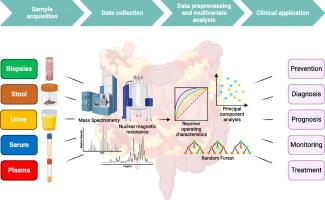通过代谢组学加深对炎症性肠病的临床认识。
IF 5.2
2区 医学
Q1 MEDICINE, RESEARCH & EXPERIMENTAL
引用次数: 0
摘要
代谢组学是一个新兴领域,涉及生物样本中多种代谢物的系统鉴定和量化。精准医疗将多组学系统生物学应用于个体患者,以进行可靠的诊断分类、疾病监测和治疗。多组学系统生物学包括基因组学、转录物组学、蛋白质组学、表观基因组学和代谢组学。因此,代谢组学技术对未来的临床决策极具价值。本综述从技术角度概述了两种常用的代谢组学测量技术:质谱(MS)和质子核磁共振(1H NMR)光谱。我们还讨论了这些技术的最新临床进展。炎症性肠病(IBD)患者在预后和对治疗的反应方面表现出显著的差异性。由于遗传易感性和环境因素都是导致这种疾病的原因,因此以代谢组为目标可能会为区分和分析具有不同临床需求的患者提供关键的见解。此外,各种疾病亚型的临床表现有相当大的重叠,这强调了加强诊断方法以改善患者护理的必要性。本文章由计算机程序翻译,如有差异,请以英文原文为准。

Metabolomics for enhanced clinical understanding of inflammatory bowel disease
Metabolomics is an emerging field involving the systematic identification and quantification of numerous metabolites in biological samples. Precision medicine applies multiomics systems biology to individual patients for reliable diagnostic classification, disease monitoring, and treatment. Multiomics systems biology encompasses genomics, transcriptomics, proteomics, epigenomics, and metabolomics. Therefore, metabolomic techniques could be highly valuable for future clinical decision-making. This review provides a technical overview of two commonly used techniques for metabolomics measurements: mass spectrometry (MS) and proton nuclear magnetic resonance (1H NMR) spectroscopy. We also discuss recent clinical advances in these techniques. Individuals with inflammatory bowel disease (IBD) exhibit significant variability in prognosis and response to treatment. Since both genetic predisposition and environmental factors contribute to this condition, targeting the metabolome may provide key insights for distinguishing and profiling patients with different clinical needs. Additionally, the considerable overlap in the clinical presentation of various disease subtypes emphasizes the need for enhanced diagnostic methods to improve patient care.
求助全文
通过发布文献求助,成功后即可免费获取论文全文。
去求助
来源期刊

Life sciences
医学-药学
CiteScore
12.20
自引率
1.60%
发文量
841
审稿时长
6 months
期刊介绍:
Life Sciences is an international journal publishing articles that emphasize the molecular, cellular, and functional basis of therapy. The journal emphasizes the understanding of mechanism that is relevant to all aspects of human disease and translation to patients. All articles are rigorously reviewed.
The Journal favors publication of full-length papers where modern scientific technologies are used to explain molecular, cellular and physiological mechanisms. Articles that merely report observations are rarely accepted. Recommendations from the Declaration of Helsinki or NIH guidelines for care and use of laboratory animals must be adhered to. Articles should be written at a level accessible to readers who are non-specialists in the topic of the article themselves, but who are interested in the research. The Journal welcomes reviews on topics of wide interest to investigators in the life sciences. We particularly encourage submission of brief, focused reviews containing high-quality artwork and require the use of mechanistic summary diagrams.
 求助内容:
求助内容: 应助结果提醒方式:
应助结果提醒方式:


